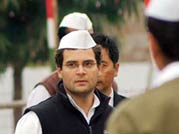
The decision ends the tense uncertainty in Congress over whether Rahul was agreeable to assume a larger responsibility. The young leader, often viewed as a reluctant inheritor, has taken a long time to step up to the plate which will now relieve Sonia Gandhi of some burden and end Congress's anxiety. Rahul's elevation might also act as an impetus to the saffron legions clamouring for the projection of Narendra Modi as their candidate for the PM's job.
In his acceptance remark, Rahul told members of CWC, some of whom were colleagues of his father Rajiv and grandmother Indira: "I have travelled the country widely in last eight years and I believe we can transform the country." The proposal to make Rahul the party vice president was moved by Defence minister A K Antony on the second day of the party's Chintan Shivir (brainstorming session) here. Antony said this was the wish of Congress workers. Sonia and Rahul indicated their agreement.
The leg-up for the Gandhi scion, as indicated by TOI on January 18, marks another generational change in Congress—the fifth from Nehru-Gandhi family after Jawaharlal, Indira, Rajiv and Sonia. Congress general secretary Janardan Dwivedi said no decision has been taken on giving Rahul the command of the coming Lok Sabha polls. But, for all practical purposes, the baton has changed hands and is likely to hasten the induction of a new AICC team. That Sonia Gandhi has decided to keep herself aloof, at least formally so, may only accelerate the transition.
Rahul had so far resisted the formal No 2 tag to the point of virtually exasperating party leaders and triggering all sorts of speculation. His elevation looked imminent when he was asked, along with three other senior leaders, to look after Congress affairs when Sonia had to go abroad for medical treatment. But the expectations proved wrong, and after the party's debacle in UP last year - an election in which Rahul led the charge - contributed to the uncertainty about Rahul's elevation.
The clamour for drafting in Rahul as the de-jure leader of the Congress reached a crescendo on January 19, eclipsing every discussion on social-economic, political and organisational challenges for which the Chintan Shivir was ostensibly called. The atmospherics of the build-up marked the takeover of the Grand Old Party by its youth brigade.
Sonia Gandhi on Friday had made it clear that youth and urban middle class were party's priorities for 2014: a reflection of the worry that the urban constituencies and the middle classes who were crucial to Congress's back-to- back Lok Sabha wins, particularly the 2009 one, had drifted away. Rahul's remark , expressing his confidence in the country's transformation, appeared to be aimed at the same constituency - aspirational India, currently disillusioned by the non-fulfilment of the promise held out by the UPA.
The new role for Rahul is also likely to be the spur for the BJP to end its ambivalence over what to do with Narendra Modi. Although the BJP leadership has come around to give a second term to Nitin Gadkari, there is recognition in the party that it cannot allow a perception of a Rahul-Gadkari match-up to grow as that is viewed to be to the BJP's disadvantage.
Rahul is only the third vice-president in Congress history after Arjun singh occupied the post under Rajiv Gandhi in 1986, and Jitendra Prasada under Sitaram Kesari in 1997.








Comments
Add new comment